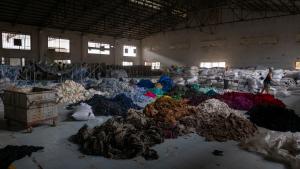
A coordinated response is necessary for promoting and implementing the circular economy agenda globally. Concrete commitments from governments, businesses, international organizations, civil society and other stakeholders will be key to building the sustainable, resilient and low-carbon economy that the world needs, and the COVID-19 pandemic has only underscored the urgency for action.
The circular economy looks beyond the take-make-waste extractive model of production and redefines growth prioritizing sustainability, reducing waste and repurposing and recycling materials and products already in use. There are hundreds of billions of dollars of material costs savings to be accrued by shifting to a circular economy approach, according to the Ellen MacArthur Foundation and opportunities for significant job creation too. This involves moving away from the idea that the circular economy is only about waste management and looking upstream in value chains and at design. Unlocking this potential will require a paradigm shift in the way our societies operate, and a holistic, economy-wide approach. A Circular Economy Action Plan adopted by the European Commission in March 2020 is one of the main building blocks of the European Green Deal – Europe’s future plan for sustainable growth, while countries from across the UNECE region have announced plans for bold action to accelerate their circularity transition.
Harnessing the circular economy to ensure a sustainable and resilient recovery from COVID-19 was the focus of a recent discussion, organized by UNECE, UNEP, and the Ellen MacArthur Foundation as a side-event to the High-Level Political Forum on Sustainable Development.
“The clock is ticking,” stressed UNECE Executive Secretary, Ms. Olga Algayerova. “The post-COVID-19 recovery must drive progress towards the SDGs, which we have committed to achieve by 2030. What’s more, it offers an opportunity to build greater resilience in the face of future crises, especially in as we grapple with the impacts of climate change.”
The exchanges highlighted circularity as the way forward to address the production and consumption side of the equation in our social and economic recovery plans and to accelerate the transition to a more just, prosperous, resilient and low-carbon economy. The session brought together thought leaders from government - including Austria, France, Switzerland and Uzbekistan - business, campaign groups and international organizations to explore concrete opportunities for action.
To deliver results, representatives from the Ellen MacArthur Foundation and UNEP agreed that action towards a circular economy needs to move beyond the remit of the Ministries of Environment and into the domain of Ministries of Finance, which write the key policies about the economy and shape how it works. Investment opportunities should be promoted in key sectors, including plastics, the built environment, mobility, textile and food. What’s more, the role of consumers should not be overlooked in driving the transition, and with it, the need for improved access to information and greater transparency for informed consumer choices.
The example of the UN/CEFACT project ‘Enhancing Transparency and Traceability of Sustainable Value Chains in Garment and Footwear’, was highlighted by Switzerland and Uzbekistan as a concrete solution for finding improved transparency solutions that support compliance with environmental and social standards, and meet the needs of government, companies and consumers alike.
As climate change increasingly takes its toll on our planet, the question of whether economies should shift to a circular economic approach is rapidly being replaced by certainty. In fact, as emphasized by the representative of France, the COVID-crisis has affirmed policy objectives of resource efficiency, value retention, biodiversity protection and the need to fight all sorts of waste, which are key to move faster, in the right direction.
“The global economy that we are all in is more and more a climate economy,” Mr. Florian Vernay from Unilever said. “This new climate economy will be a circular economy – there is absolutely no doubt of that.”
To explore UNECE tools to help countries and companies accelerate their shift to the circular economy, visit https://unece.org/circular-economy-0

